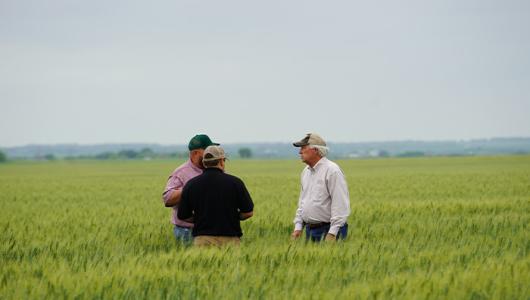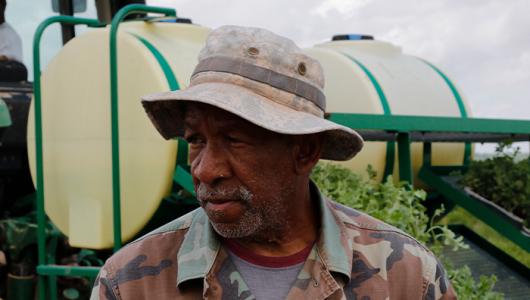This Friday, meet Adrian Fortin, a dairy farmer in Holland, Vermont. His small, 380-acre farm has been in his family since 1922, when his grandparents, Henry and Cecil Fortin, purchased it. For over one hundred years, the family has provided Vermonters with locally sourced milk.
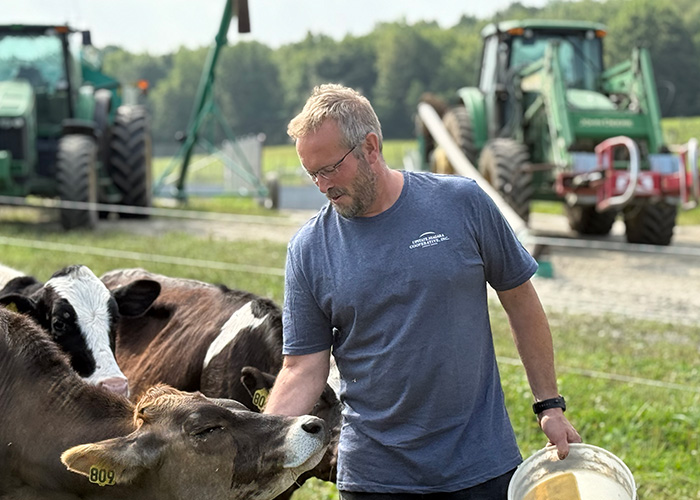
Adrian’s farm is home to over 300 head of dairy cattle. Following proper feeding practices to ensure that his cows have the necessary nutrients for milk production, he’s had to come up with an effective manure management plan for the 4,428 gallons of manure they produce each day.
Establishing a Plan
Adrian reached out to his local USDA Natural Resources Conservation Service (NRCS) office for help in coming up with a manure management plan that ensures environmental compliance, protects water quality, and capitalizes on manure’s value as a nutrient-rich fertilizer. It was determined that a new waste storage facility was needed.
Adrian applied for assistance through the Environmental Quality Incentives Program (EQIP), teaming up with NRCS staff in Vermont and local state conservationists to turn the one-hundred-year-old farm into the twenty-first century with a modern waste storage facility.
“For much of the farm’s existence, the Fortin family had to utilize an undersized earthen manure storage system that was inefficient and caused environmental problems,” said NRCS Conservation Planner Brittany Choiniere. “It also had failing structural integrity, and the gravity manure transfer system was no longer functioning.”
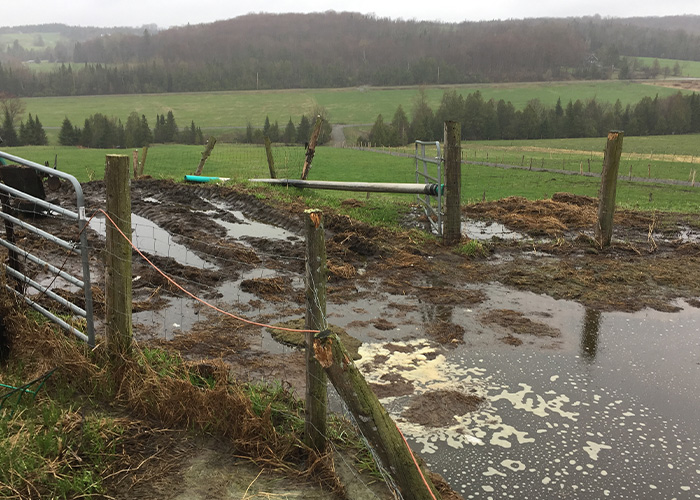
These kinds of issues are common with old family farms like Adrian’s. Nearly one hundred years later, in 2019, Adrian closed his successful engine repair shop to return to the farm to help his father, Ed, who was dealing with health problems.
“It wasn’t an easy decision to close something that you built up and lose loyal customers, but farming is in my blood, I felt a responsibility to uphold the family tradition,” said Adrian.
Acts of Nature
Less than a year later, in 2020, just as COVID-19 pandemic hit, the family suffered a tragedy when Ed passed away due to complications from amyotrophic lateral sclerosis (ALS).
“My father worked right up until the end,” said Adrian. “Among the many improvements on the farm he wanted was an improved manure pit. I remember meeting at my parents’ house with NRCS Engineer Jake Clough and NRCS Soil Conservationist Phylicxia Moore about replacing the earthen pit with a modern, up-to-date concrete storage facility. My father didn't speak very well due to ALS, so he had to write notes to Jake that listed the specific improvements he wanted.”
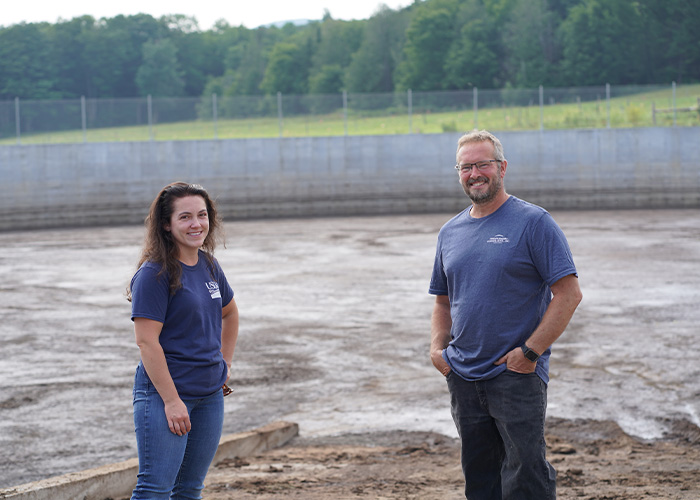
In accordance with his father’s wishes, NRCS staff got to work and collaborated with partners from around the state. They worked closely with the Vermont Agency of Agriculture Food and Markets’ Best Management Practices Program team to coordinate additional grant funding.
“This would not have been possible without grant assistance from Vermont Agency of Agriculture Food and Markets,” said Brittany.
Once funding was secured, work was able to begin constructing a concrete waste storage facility on the Fortin family farm.
Things looked promising before Mother Nature stepped in on July 9, 2023, when multiple rounds of heavy rainfall led to destructive flash floods in Vermont.
“During the storm, water flooded off the hillside, overtopped culverts, and ran through the barns into the gravity manure transfer system,” said Brittany. “All of the water ended up dumping directly into the manure pit.”
Massive quantities of gravel were lost and an excavation crew ended up having to spend weeks repairing the damage which resulted in additional financial contributions the farm had not planned on. Despite all of this, the farm and the team pushed on.
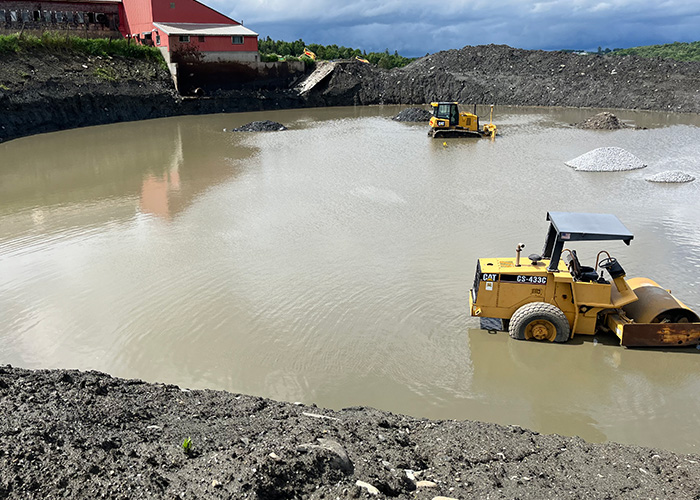
Perseverance and the Completion of Conservation Efforts
Persevering through setbacks, the concrete waste storage facility was eventually wrapped in late 2024. The benefits of the new concrete waste storage facility include better odor control, superior containment, and easier agitation and pumping of manure to use as fertilizer. It has the capacity to hold 240 days of manure so the Adrian can have nutrients securely sitting in the tank and use them when they’re most needed.
“With the size of the pit and the extra storage space, it gives us the chance to spread when the weather is right and field conditions are good, versus our old pit that was ready to run over in the springtime so you had to spread right off,” said Adrian.
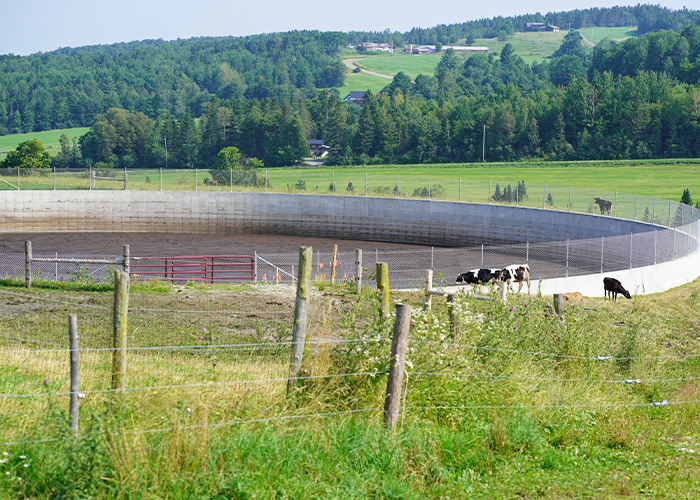
With the project complete, the Fortin family has a fully functional above-ground waste storage facility that conserves resources and helps the land.
“I’ve made it a point to work with NRCS because they’ve kept us on the forefront of being proactive with resource management,” said Adrian. “They were very easy to work with. Brittany did a good job of communicating what assistance was available and Jake was very helpful in the construction of the waste storage facility.”
More Information
Visit local farms, ranches, forests, and resource areas through our Fridays on the Farm stories. Meet farmers, producers, and landowners who are working to improve their operations with USDA programs.
USDA offers a variety of risk management, disaster assistance, loan, and conservation programs to help producers weather ups and downs in the market, recover from natural disasters, and invest in improvements to their operations. Learn about additional programs.
For more information about USDA programs and services, contact your local USDA service center.
Quentin Melson is a public affairs specialist for NRCS in Vermont.

